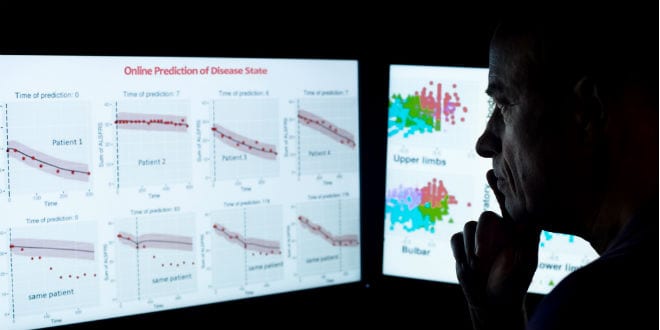There are few diseases as devastating as amyotrophic lateral sclerosis (ALS), which is more familiar to the general public as Lou Gehrig’s disease. The name was taken from the New York Yankees’ star first-baseman who died in 1941 of ALS just two weeks shy of his 38th birthday.
The progressive neurological disorder involves the gradual deterioration and death of motor neurons extending from the brain to the spinal cord and to muscles throughout the body.
Messages from upper motor neurons in the brain are transmitted to motor neurons in the spinal cord and to lower motor neurons and from the spinal cord and motor nuclei of brain to a particular muscle or muscles.
Unable to function, the muscles gradually weaken, start to twitch and waste away; eventually, the brain loses its ability to initiate and control voluntary movements.
Although it is not yet curable, researchers at Ben-Gurion University of the Negev in Beersheba and BGN Technologies, the university’s technology transfer company, have announced their development of a new artificial intelligence (AI) platform for monitoring and predicting the progression of ALS. The precision-medicine platform assists in finding markers for personalized patient care and improves drug development of neurodegenerative diseases.
The technology, developed by Prof. Boaz Lerner of BGU’s industrial engineering and management department, will focus initially on ALS and later be adapted to various other neurodegenerative diseases such as Parkinson’s and Alzheimer’s disease.
Research and drug development for ALS are complicated by the variety of ALS patients leading to variability in symptoms at onset, disease progression rate and pattern and survival. The new platform, however, will make possible reliable categorization of patients into homogenous sub-groups and personalized prediction of disease progression rate, as well as creating a pattern of sub-populations. This, say the Israeli researchers, will improve care of patients and raise their quality of life.
The platform can also improve the design of trials and the ability to assess the influence of treatment in clinical studies by identifying markers of various patient sub-populations for which treatment is beneficial, thus improving success rate of the studies.
The platform integrates demographic and clinical data with machine learning and data mining algorithms to produce models that can predict the rate and pattern of ALS progression, identify factors essential for the prediction such as specific lab tests or vital signs. As clinical data are added for each patient, the algorithms – and thus the disease progression prediction – improve.
“One of the big challenges of designing and managing clinical trials for ALS stems from the fact that not only is it a rare disease, but also clinical heterogeneity makes it hard to identify markers correlating with disease severity for enabling successful clinical trials,” explained Lerner.
“As a result, after decades of research, there is still no real cure for ALS and other neurodegenerative diseases, such as Alzheimer’s disease. But our novel platform, which uses machine learning algorithms, will enable not only accurate prediction of disease progression – a crucial ingredient for better clinical trials – but also identification of interrelationships between demographics and measurable factors from physical examinations and patient functioning that will advance clinical research of this devastating condition,” Lerner said.
“Now that the algorithms producing the models have been established and evaluated, the funding we recently received from the Israel Innovation Authority will enable researchers to create a system that can be implemented on personal computers, the cloud and cellular applications for personalized monitoring and prediction of ALS progression for the sake of patients, physicians, caregivers, pharmaceutical companies and health maintenance organizations, added Itzik Mashiach, head of business development at BGN Technologies. “We are now seeking an industry partner for the further development and commercialization of this innovative patent-pending technology.”
Source: Israel in the News


